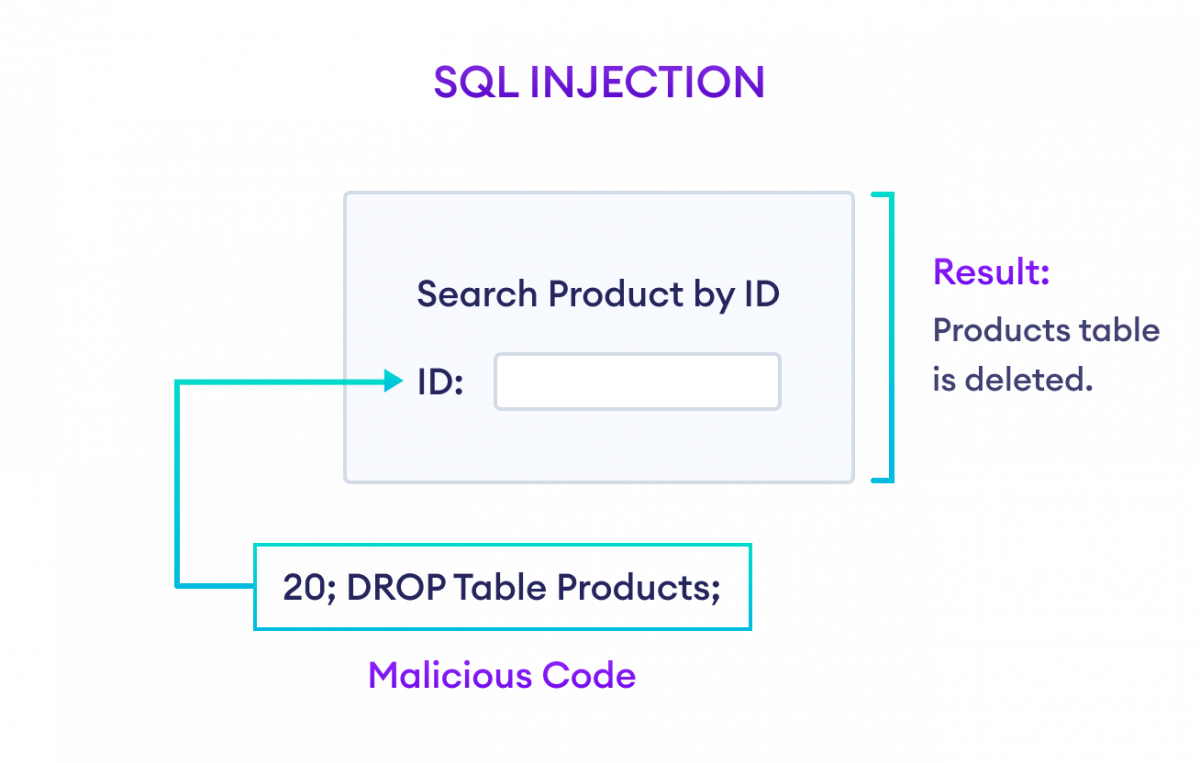SQL Injection is a technique where SQL commands are executed from the form input fields or URL query parameters. This leads to unauthorized access to the database (a type of hacking).
If an SQL injection is successful, unauthorized people may read, create, update or even delete records from the database tables. This technique is mainly used by (but not limited to) hackers, pentesters, QAs and security researchers.
SQL Injection Using Multiple Statements
Suppose we have a search form to search products by their ID on our website. The PHP code snippet to search product would look something like,
$prod_id = $_GET["prod_id"];
$sql = "SELECT * FROM Products WHERE product_id = " . $prod_id;
If the user inputs 20; DROP TABLE Products; in the form, then the SQL statement becomes,
SELECT * FROM Products WHERE product_id = 20; DROP TABLE Products;
Now, this SQL statement deletes the Products table from the database. This is possible because most database systems can execute multiple statements at the same time.

SQL Injection Using Always True Condition
Another way to perform an SQL injection is by passing a condition that always results in TRUE so that the data is always fetched no matter what.
Let's take a look at another PHP code snippet where we have a login form in our website and we need to fetch users by providing credentials.
$username = $_POST["username"];
$password = $_POST["password"];
$sql = "SELECT * FROM Users WHERE username = \"" . $username . "\" AND password = \"" . $password . "\"";
If the user inputs username as invalid_user" OR "1"="1 and password as invalid_pass" OR "1"="1, then the SQL statement becomes
SELECT * FROM Users WHERE username = "invalid_user" OR "1"="1" AND password = "invalid_pass" OR "1"="1"
Since, "1"="1" is always TRUE, no matter what the username and password user enters, SQL will fetch the data of all users from the database.
How to Protect SQL Statements From Injections?
Validate User Input
We should always validate the user's input data before actually sending them to the database. Some best practices include: trimming spaces, parsing special characters, limiting the input size, etc.
For example,
$data = $_POST["name"];
$data = trim($data);
$data = stripslashes($data);
$data = htmlspecialchars($data);
Here, this PHP code snippet validates input data to some extent.
Using ORMs
ORM (Object Relational Mapping) is a tool that basically parses SQL statements into programming language code and vice-versa.
If we use ORM's, we don't have to write raw SQL for the most part. Since ORM's are designed by following good practices and security protocols, they are safe and easy to use.
For example, consider the SQL code below:
SELECT * FROM Users WHERE id = 5;
Its equivalent code in SQLAlchemy ORM for Python will be:
select(Users).where(Users.id == 5)
Using Prepared Statements
Another method to protect SQL statements from injections is by using prepared statements.
Prepared statements are basically SQL statements but with placeholders. The passed arguments are just replaced in place of the placeholders.
For example,
$sql = "INSERT INTO Users (first_name, last_name, email) VALUES (?, ?, ?)";
mysqli_stmt_bind_param($sql, "sss", $first_name, $last_name, $email);
$first_name = "Harry";
$last_name = "Potter";
$email = "[email protected]";
mysqli_stmt_execute($stmt);
Here, the values are only placed in place of the ? placeholder and the structure of SQL statements are preserved.
Using Frameworks
Also, if we are building a real world application, it's always a good idea to use frameworks (such as Django, Laravel, ASP.net, etc.) instead of writing code from scratch.
It's because these frameworks handle SQL injection and many other commonly occurring issues by default.
Conclusion
SQL Injection is a very common way of hacking any web application.
So, if we use raw SQL statements while building our application, we must test and verify them thoroughly.